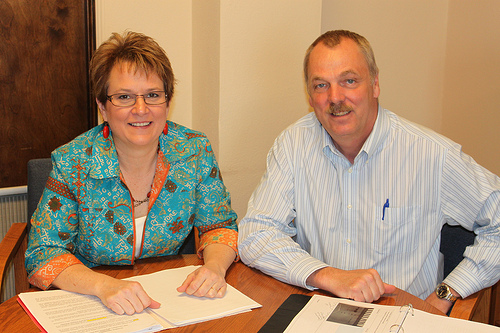Married OSU researchers expand work through grants
Friday, February 18, 2011

After meeting in graduate school as softball teammates and later marrying, Drs. Wendy and Bill Picking have been researching infectious diseases for 20 years with a satisfaction that comes from multiple sources, including the grants that helped make it all possible.
Bill, who serves as microbiology department head, pursues research that focuses on determining the basic virulence mechanisms of Shigella flexneri, diarrhea-causing bacteria prevalent in developing countries. He studies the proteins that the bacteria secrete to allow invasion of human intestinal cells.
Wendy, an associate microbiology professor, also researches the same pathogen. However, she is working toward developing a vaccine against Shigella, the second leading cause of death in children under five in developing countries.
The Pickings agree that their favorite aspect of the research is the practical benefits it provides for society. “We can apply what we learn in the basic sciences to our vaccine development and toward disease prevention,” said Wendy.
For Bill, it’s the end results that are most satisfying. “If you’re a physician, you can help maybe 20 people in a day. When you’re doing disease prevention research, if everything works right, you help one hundred million people,” he said.
However, without receiving grants, their research efforts to prevent this disease would not be possible. “It takes money to do science,” Wendy said. “Without money from funding agencies, you just can’t do it on your own.”
One of Wendy’s grants provided about $250,000 per year to do things like pay for the salary of student workers and technicians, pay for animal studies, and cover other research expenses.
Acquiring a grant is a competitive process that Bill describes as an “ongoing cycle” that begins with the university and the start-up funds they provide. “The university is investing in a new researcher saying, ‘With this money you can get your research started and eventually get a grant.’ And when you start getting the grants, then the university is awarded an additional amount of money, so ultimately it ends up paying for itself.”
The Pickings said they can work 60 to 80 hours or more in a given week doing research, or working toward new grants and teaching. The couple’s dedication has paid off, they’ve received five grants since their arrival to OSU in June 2009. Their 2010 grants include two from the National Institute of Allergy and Infectious Disease, one from the Oklahoma Center for the Advancement of Science and Technology, and one from the Program for Appropriate Technology in Health, all of which support their research efforts.
The grants have also helped the Pickings realize their greatest accomplishments: the successful students who have graduated from their laboratories. “The research is what drives it all, but there’s nothing like a former student calling to say, ‘I just had a paper published,’” Wendy said.
